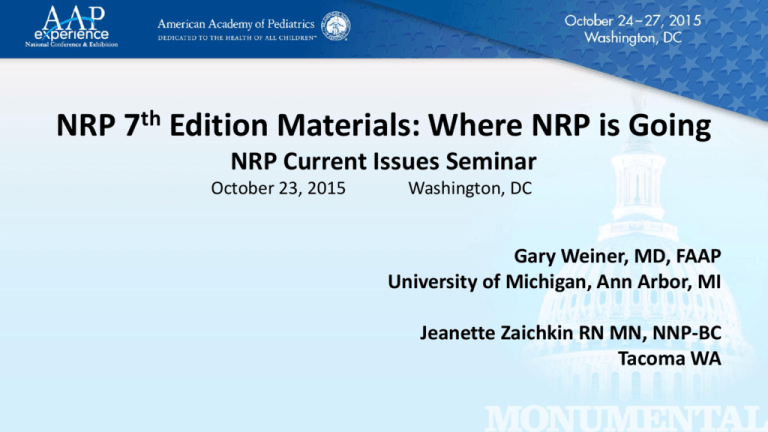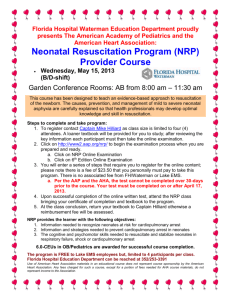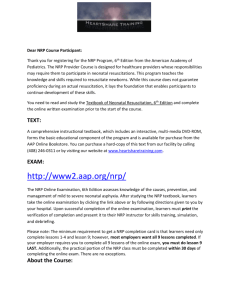Where NRP is Going - American Academy of Pediatrics
advertisement

NRP 7th Edition Materials: Where NRP is Going NRP Current Issues Seminar October 23, 2015 Washington, DC Gary Weiner, MD, FAAP University of Michigan, Ann Arbor, MI Jeanette Zaichkin RN MN, NNP-BC Tacoma WA Faculty Disclosure Information In the past 12 months, we have no relevant financial relationships with the manufacturer(s) of any commercial product(s) and/or provider(s) of commercial services discussed in this CME activity. • We are compensated editors and consultants for the American Academy of Pediatrics/NRP and, as such, have contractual relationships to produce AAP/Laerdal co-branded educational materials • We receive no financial benefit from the sale of these materials We do NOT intend to discuss an unapproved/investigative use of a commercial product/device in this presentation. Session Objectives • Discuss changes to the requirements for achieving Provider status • Describe how eSimulation integrates into 7th edition NRP • Describe changes in the path to becoming an instructor • Identify improvements for NRP instructors and providers in the new database • Discuss changes to the structure of the 7th edition textbook • Identify major changes in resuscitation practice How to achieve Provider status • Self-study the textbook as needed • Pass the online examination (all 11 lessons) • Complete at least 3 online eSimulation practice scenarios • Meet the objectives of the in-person Provider course eSimulation • • • • What it is Anyone can do it Learning experience, not testing After accessing eSimulation for Provider status, you may access scenarios for practice anytime Path to becoming an instructor Beginning January 1, 2017 NRP instructor candidates must • be physicians, registered nurses, respiratory care practitioners, or physician assistants with experience in the hospital care of newborns in the delivery room • have current maternal-child educational or clinical responsibility within a hospital setting It is recommended that NRP instructors and instructor candidates have ongoing delivery room experience. Path to becoming an instructor 1. 2. 3. 4. 5. 6. 7. Possess a current NRP provider card for all lessons Apply online through the AAP Review Instructor Toolkit content and complete the online instructor course Pass the NRP online instructor examination Designate an eligible NRP instructor mentor Co-teach 2 provider courses with your instructor mentor Participate in at least one “debrief the debriefer” session with your instructor mentor Online Instructor Toolkit • • • • • • • • All instructional resources in one location (keyword searchable) Replaces the NRP Instructor Manual No NRP Instructor DVD to purchase No additional fee to access the instructor course, eSimulation, and the online examination for instructors (includes continuing education credits) A webinar for NRP instructor mentors available anytime Downloadable PDFs of most commonly used documents and checklists for use in NRP Provider courses Podcasts by neonatal resuscitation experts Continuously updated educational materials and new resources throughout the life of the 7th Edition The new NRP Database and Learning Management System • Launching with NRP 7th edition materials in Spring 2016 • Course registration, completion history and educational resources (eg, online examination, eSimulation, instructor resources) in one place. • Can access/e-mail eCard at any time What’s new about the textbook’s structure? 1. Foundations 2. Preparing for Resuscitation 3. Initial Steps of Newborn Care 4. Positive-pressure Ventilation 5. Alternative Airways 6. Chest Compressions 7. Medications 8. Post-resuscitation Care 9. Resuscitation and Stabilization of Babies Born Preterm 10. Special Considerations 11. Ethics and Care at the End of Life New sections • “Focus on Teamwork” – Integrates emphasis on teamwork and communication with lesson content • “Frequently Asked Questions” – Controversies and questions commonly sent to the NRPSC • “Ethical considerations” – Highlight questions to consider in context of lesson content Drawings replaced with color photos What are the major changes in the NRP practice recommendations? • Delay cord clamping for 3060 seconds for most term and preterm newborns – Place skin-to-skin with mom • No delay if placental circulation disrupted (abruption, avulsion) • Insufficient evidence re: timing if baby is not vigorous Time of birth is still the time when the baby emerges from its mother, not the time of cord clamping… Routine tracheal suction no longer recommended for NON-VIGOROUS babies with meconium stained fluid – MSAF is a risk factor that requires presence of a team member with intubation skill Initial HR assessed by auscultation – Palpation of the umbilical cord is less reliable and less accurate Initial HR assessed by auscultation • PPV begins, consider electronic cardiac monitor • Resuscitation anticipated or chest compressions begin, electronic cardiac monitor is preferred method Initial FiO2 for PPV • 35 weeks’ GA = 21% • < 35 weeks’ GA = 21-30% PPV Steps Clarified Intubation • Strongly recommended before starting chest compressions • Estimate tip-to-lip distance with new table or nasaltragus length (NTL) Nasal-Tragus Length Compressions • Use 2-thumb technique • Head-of-bed compressions • Cardiac monitor recommended • Continue for 60 seconds prior to checking a heart rate. Medications • Only 2 medications to remember – Epinephrine • IV or IO preferred • ET x 1 while achieving intravascular access – Normal saline Preterm • Less than 32 weeks’ gestation – Without drying, cover in food-grade plastic wrap or bag and use a hat and thermal mattress – Use a 3-lead cardiac monitor (chest or limb leads) for rapid and reliable continuous HR • If PPV, use a device with PEEP • Consider CPAP immediately after birth as an alternative to routine intubation and surfactant administration. Increased Emphasis • Teamwork • Preparation before resuscitation – Structured check of equipment and supplies – Identifying roles • Accurate documentation What hasn’t changed? Veni, Venti, Vici “Ventilation of the lungs is the single most important and most effective step in cardiopulmonary resuscitation of the compromised newborn.”


